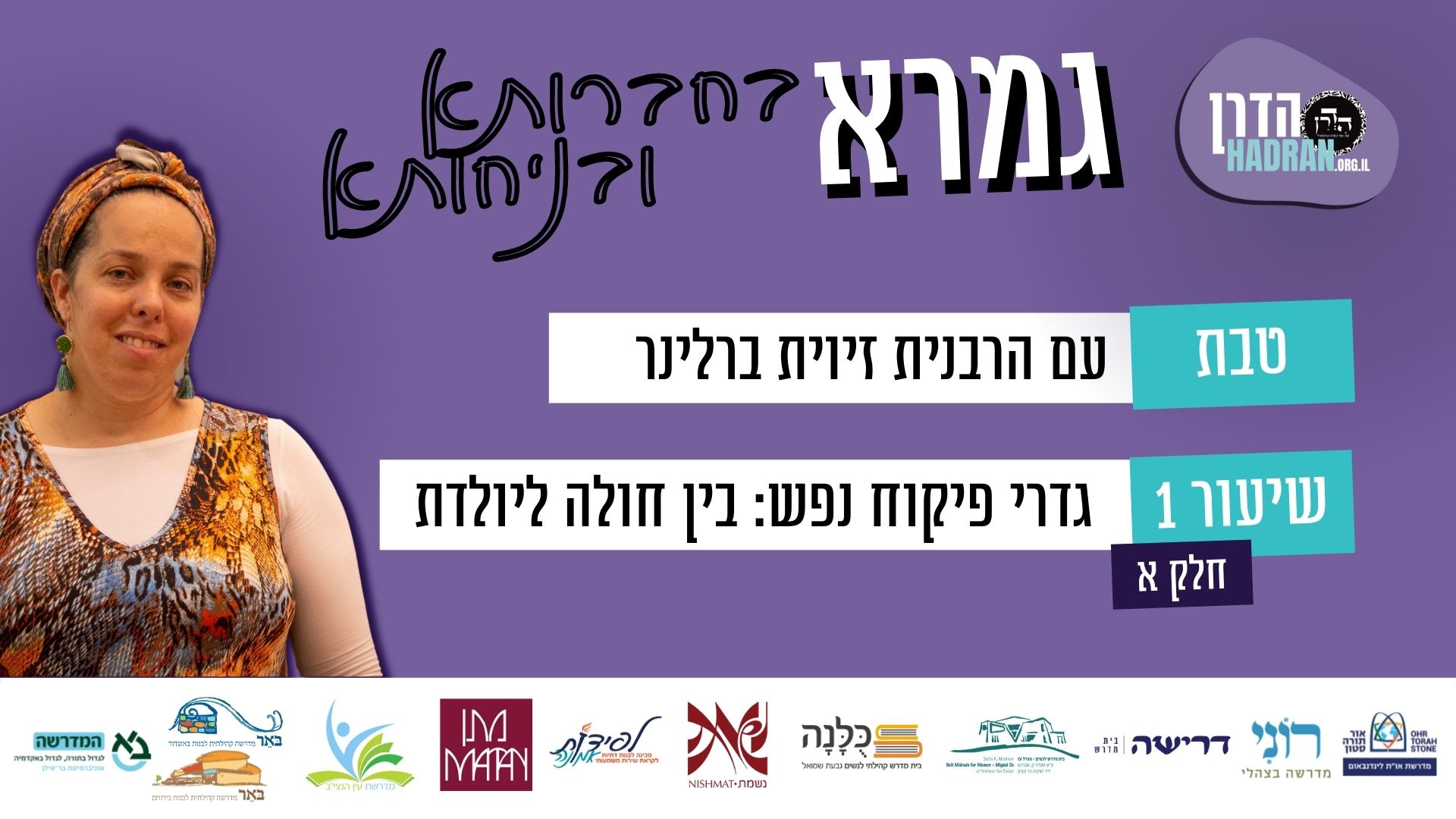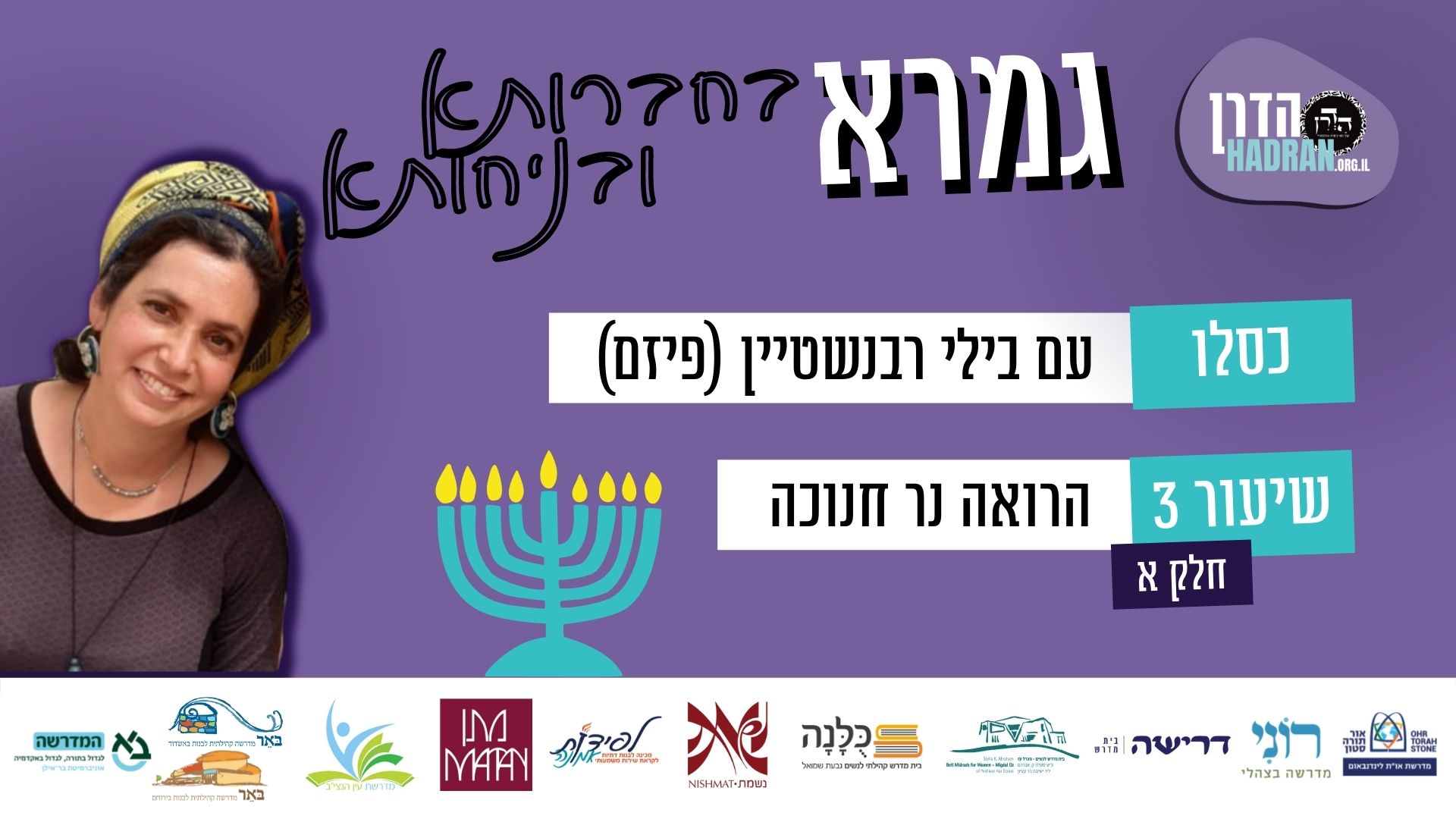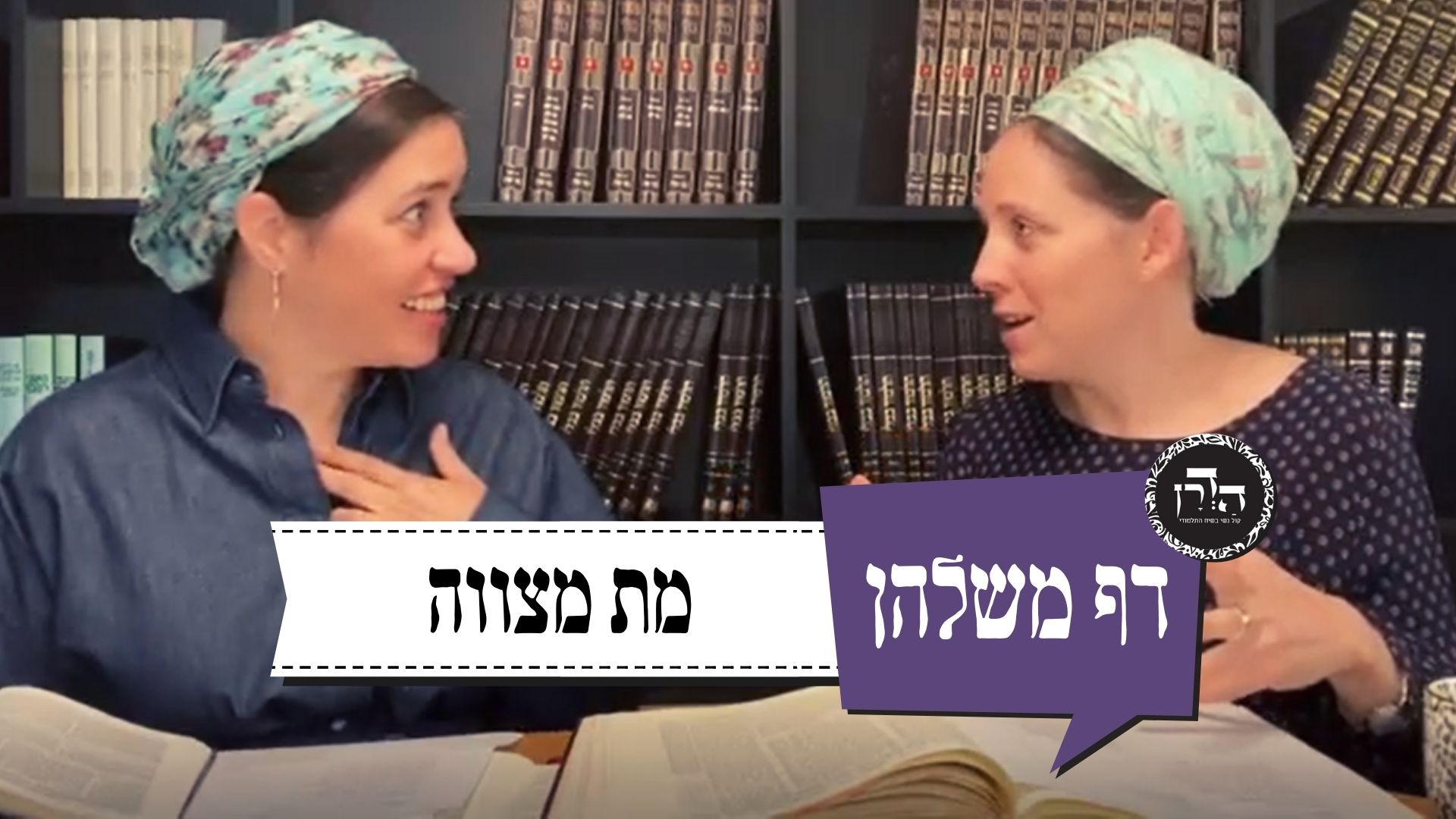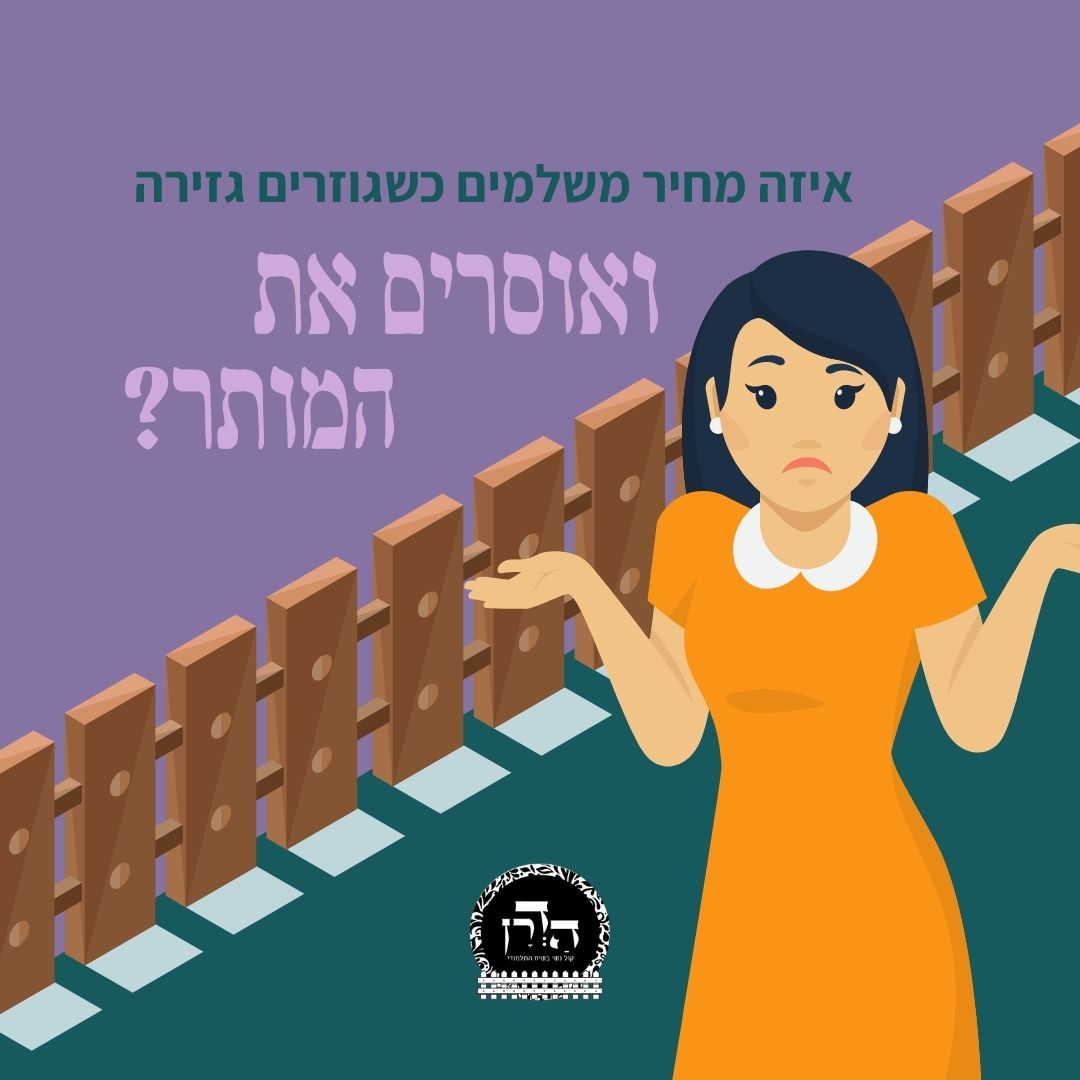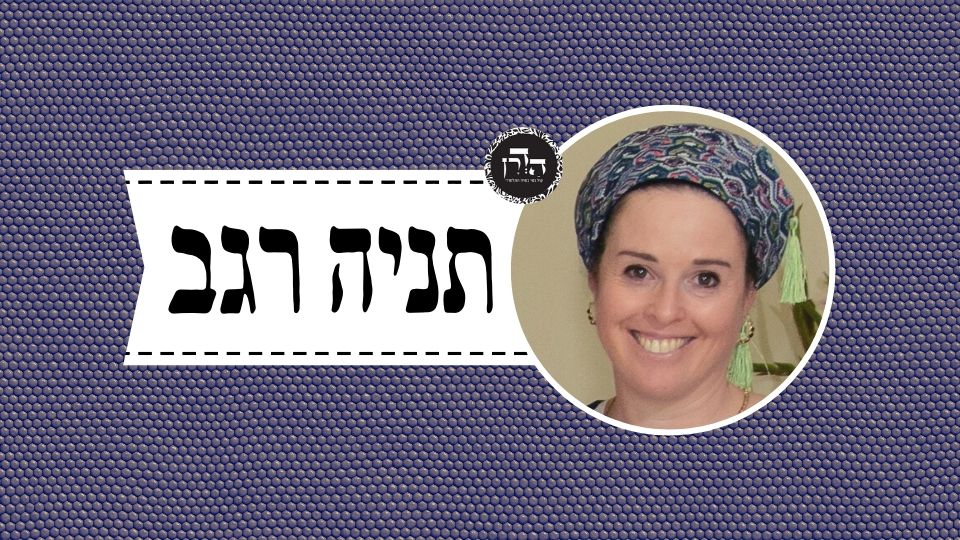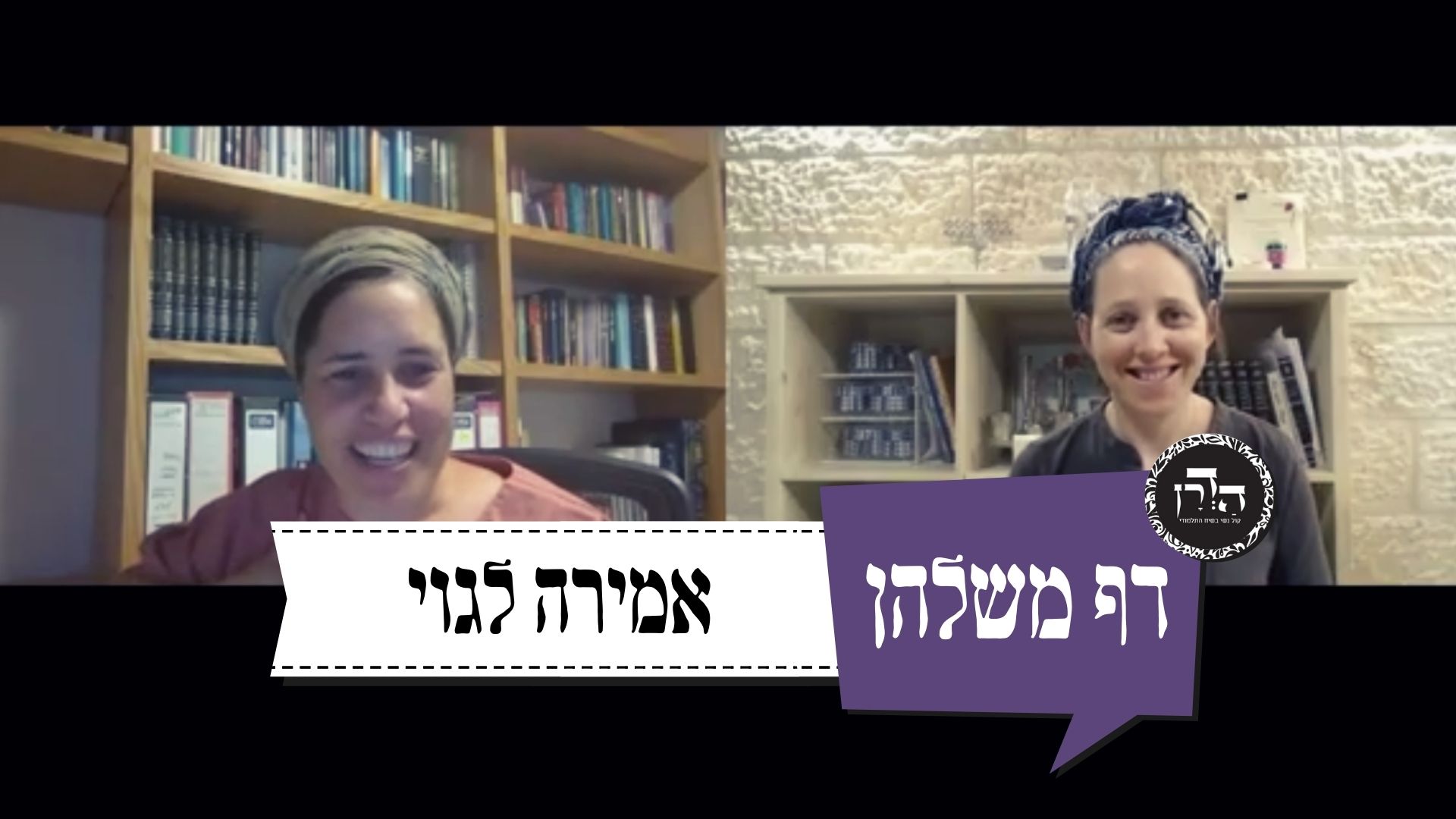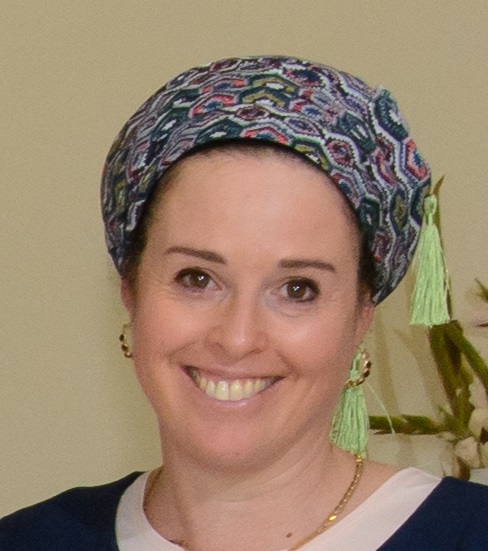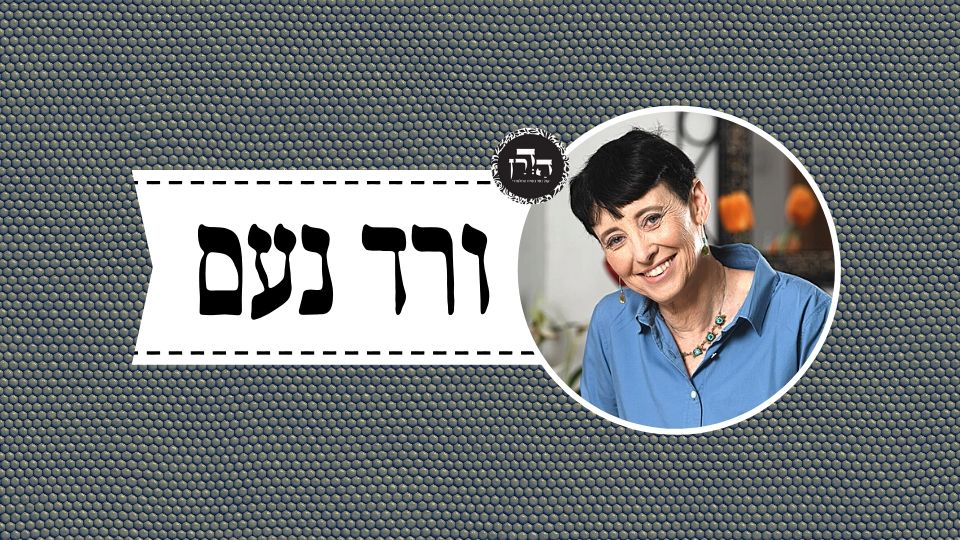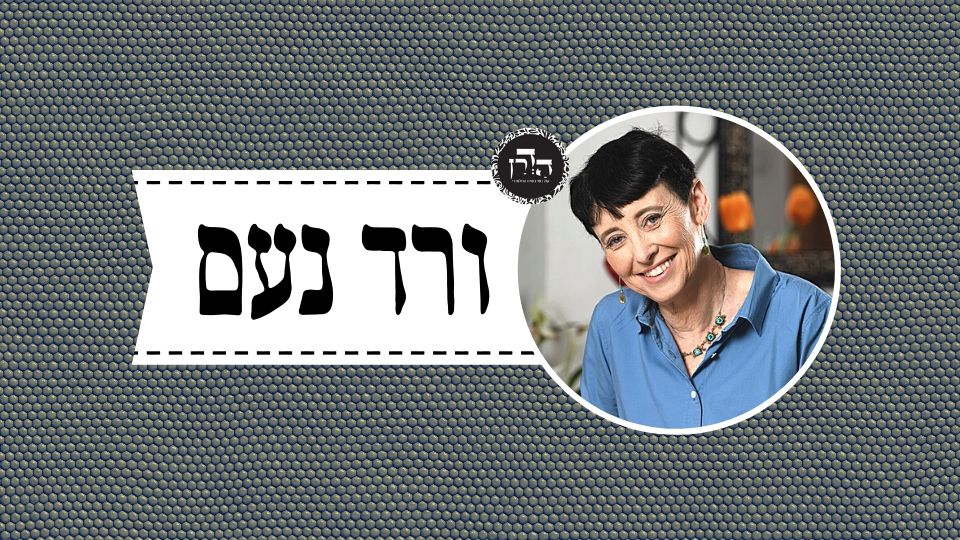הגמרא ממשיכה להביא תירוצים שונים איך יכול המשנה לחייב במקרים אלו כשאין הנחה או עקירה ממקום ארבעה טפחים על ארבעה טפחים. סך הכל מביאים ששה תירוצים לשאלה הזאת ומקשים על כולם חוץ מהאחרון – של רבא – שידו של אדם נחשב כארבעה על ארבעה. הגמרא מביאה הרבה הלכות שנאמרו על ידי ר’ יוחנן בדברים הדומים לעניינים הנלמדים כגון זריקת חפץ למישהו אחר ברשות הרבים (יותר מד’ אמות) או זרק בעצמו ואז רץ בעצמו ותפס, או לקח מי גשמים מרשות היחיד והעביר לרשות הרבים, לקח מאכלים ורצה להעבירם בתוך הבית ויצא החוצה לרשות הרבים – האם במקרים האלה חייבים? באילו תנאים?
כלים
העמקה
רוצה להבין מה באמת קורה מתחת לפני השטח של הסוגיה?
שיעורים, פודקאסטים והרחבות של מיטב המורות שלנו יפתחו לך עוד זוויות וכיווני חשיבה.
חדשה בלימוד הגמרא?
זה הדף הראשון שלך? איזו התרגשות עצומה! יש לנו בדיוק את התכנים והכלים שיעזרו לך לעשות את הצעדים הראשונים ללמידה בקצב וברמה שלך, כך תוכלי להרגיש בנוח גם בתוך הסוגיות המורכבות ומאתגרות.
פסיפס הלומדות שלנו
גלי את קהילת הלומדות שלנו, מגוון נשים, רקעים וסיפורים. כולן חלק מתנועה ומסע מרגש ועוצמתי.
שבת ה
לָא מְחַיֵּיב רַבִּי אֶלָּא בִּרְשׁוּת הַיָּחִיד מְקוֹרֶה, דְּאָמְרִינַן: בֵּיתָא כְּמַאן דְּמַלְיָא דָּמְיָא. אֲבָל שֶׁאֵינוֹ מְקוֹרֶה — לָא.
Rabbi Yehuda HaNasi only deemed him liable in the covered private domain, with a roof, as we say: The house is considered as one that is full? The entire house with all its space is considered one unit, and each part of it is considered as if it is filled with actual objects. Therefore, an object passing through the house is considered as if it landed on an actual surface of at least four by four handbreadths. However, in a private domain that is not covered, Rabbi Yehuda HaNasi does not deem him liable.
וְכִי תֵּימָא הָכָא נָמֵי בִּמְקוֹרֶה — הָתִינַח בִּרְשׁוּת הַיָּחִיד מְקוֹרֶה, בִּרְשׁוּת הָרַבִּים מְקוֹרֶה מִי חַיָּיב? וְהָאָמַר רַב שְׁמוּאֵל בַּר יְהוּדָה אָמַר רַבִּי אַבָּא אָמַר רַב הוּנָא אָמַר רַב: הַמַּעֲבִיר חֵפֶץ אַרְבַּע אַמּוֹת בִּרְשׁוּת הָרַבִּים מְקוֹרֶה, פָּטוּר — לְפִי שֶׁאֵינוֹ דּוֹמֶה לְדִגְלֵי מִדְבָּר.
And if you say: Here too our mishna is speaking about a covered domain, and therefore the lifting from and the placing on the hand are considered as if they were performed in a place that is four handbreadths; granted, in a covered private domain lifting from and placing in a hand are considered as if it were lifted from and placed onto an area of four by four handbreadths, but in a covered public domain is he liable at all? Didn’t Rav Shmuel bar Yehuda say that Rabbi Abba said that Rav Huna said that Rav said: One who carries an object four cubits from place to place in a covered public domain, even though transferring an object four cubits in the public domain is like carrying out from one domain to another and prohibited by Torah law, in this case, he is not liable? The reason is that since the covered public domain is not similar to the banners in the desert, i.e., the area in which the banners of the tribes of Israel passed in the desert. The labors prohibited on Shabbat are derived from the labors that were performed in the building of the Tabernacle during the encampment of Israel in the desert, and the desert was most definitely not covered. Consequently, even according to Rabbi Yehuda HaNasi’s opinion, it is impossible to explain that our mishna is referring to the case of a covered public domain.
אֶלָּא אָמַר רַבִּי זֵירָא: הָא מַנִּי? — אֲחֵרִים הִיא. דְּתַנְיָא: אֲחֵרִים אוֹמְרִים: עָמַד בִּמְקוֹמוֹ וְקִבֵּל — חַיָּיב, עָקַר מִמְּקוֹמוֹ וְקִבֵּל — פָּטוּר. עָמַד בִּמְקוֹמוֹ וְקִבֵּל — חַיָּיב, הָא בָּעֵינַן הַנָּחָה עַל גַּבֵּי מְקוֹם אַרְבָּעָה וְלֵיכָּא! אֶלָּא שְׁמַע מִינַּהּ לָא בָּעֵינַן מְקוֹם אַרְבָּעָה.
Rather, Rabbi Zeira said: There must be a different source for our mishna. Whose opinion is it in our mishna? It is the opinion of Aḥerim, as it was taught in a baraita: Aḥerim say: One who stood in his place on Shabbat and received an object thrown to him from another domain, the one who threw the object is liable for the prohibited labor of carrying out, as he both lifted and placed the object. However, if the one who received the object moved from his place, ran toward the object, and then received it in his hand, he, the one who threw it, is exempt. That is because, even though he performed an act of lifting, the placing of the object was facilitated by the action of the one who received it, and therefore the one who threw it did not perform the act of placing. In any case, according to the opinion of Aḥerim, if he stood in his place and received the object, the one who threw it is liable. Don’t we require placing upon an area of four by four handbreadths and there is none in this case? Rather, certainly conclude from this that according to Aḥerim we do not require an area of four by four.
וְדִילְמָא הַנָּחָה הוּא דְּלָא בָּעֵינַן, הָא עֲקִירָה בָּעֵינַן. וְהַנָּחָה נָמֵי, דִּילְמָא דִּפְשֵׁיט כַּנְפֵיהּ וְקַבְּלַהּ — דְּאִיכָּא נָמֵי הַנָּחָה.
The Gemara rejects this: This is not a proof, and one could say: Perhaps it is specifically for placing that we do not require an area of four by four; however, for lifting we require an area of four by four in order to consider it significant. And with regard to placing as well, one could say: Perhaps it was performed in a manner in which he extended the corners of his coat and received it, so in that case there is also placing upon an area of four by four. Therefore, there is no proof from here.
אָמַר רַבִּי אַבָּא: מַתְנִיתִין, כְּגוֹן שֶׁקִּבֵּל בִּטְרַסְקָל וְהִנִּיחַ עַל גַּבֵּי טְרַסְקָל, דְּאִיכָּא נָמֵי הַנָּחָה. וְהָא ״יָדוֹ״ קָתָנֵי? — תְּנִי ״טְרַסְקָל שֶׁבְּיָדוֹ״.
Rabbi Abba said: Our mishna is speaking about a special case where he received, i.e., lifted, the object that was in a basket [teraskal] and he placed it atop a basket. In that case, there is also placing performed upon an area of four by four handbreadths. The Gemara asks: Wasn’t it taught in the mishna: His hand? So how can you say that he received it in a basket? The Gemara answers: Emend the text of the mishna and teach: The basket in his hand.
הָתִינַח טְרַסְקָל בִּרְשׁוּת הַיָּחִיד, אֶלָּא טְרַסְקָל שֶׁבִּרְשׁוּת הָרַבִּים רְשׁוּת הַיָּחִיד הוּא.
The Gemara asks about this matter: Granted, when the basket was in the private domain, but if it was a basket that was placed in the public domain, doesn’t it immediately become the private domain? Presumably, the basket is ten handbreadths above the ground, and its surface is the requisite size for creating a private domain.
לֵימָא דְּלָא כְּרַבִּי יוֹסֵי בְּרַבִּי יְהוּדָה. דְּתַנְיָא, רַבִּי יוֹסֵי בְּרַבִּי יְהוּדָה אוֹמֵר: נָעַץ קָנֶה בִּרְשׁוּת הָרַבִּים וּבְרֹאשׁוֹ טְרַסְקָל, זָרַק וְנָח עַל גַּבָּיו — חַיָּיב.
Since that is not the explanation given, let us say that this is a proof that our mishna is not in accordance with the opinion of Rabbi Yosei, son of Rabbi Yehuda. As it was taught in a baraita: Rabbi Yosei, son of Rabbi Yehuda, says: One who stuck a stick into the ground in the public domain, and hung a basket atop it, and threw an object from the public domain, and it landed upon it, he is liable, because he threw it from the public domain into the private domain. Since the surface of the basket is four by four handbreadths and it is ten handbreadths above the ground, it is considered a private domain. Even though the stick, which is serving as the base for this basket, is not four handbreadths wide, since the basket is that wide, we consider it as if the sides of the basket descend in a straight line. Consequently, a type of pillar of a private domain is formed in the public domain.
דְּאִי כְּרַבִּי יוֹסֵי בְּרַבִּי יְהוּדָה, פָּשַׁט בַּעַל הַבַּיִת אֶת יָדוֹ לַחוּץ וְנָתַן לְתוֹךְ יָדוֹ שֶׁל עָנִי אַמַּאי חַיָּיב? מֵרְשׁוּת הַיָּחִיד לִרְשׁוּת הַיָּחִיד קָא מַפֵּיק!
Our mishna is not in accordance with the opinion of Rabbi Yosei, son of Rabbi Yehuda, as if it were in accordance with the opinion of Rabbi Yosei, son of Rabbi Yehuda, in a case where the owner of the house extended his hand outside and placed an object in the basket in the hand of the poor person in the public domain, why is he liable? According to his opinion, the basket is considered a private domain and he, the owner of the house, is merely carrying out from private domain to private domain. This proves that the opinion of our mishna is not in accordance with the opinion of Rabbi Yosei, son of Rabbi Yehuda.
אֲפִילּוּ תֵּימָא רַבִּי יוֹסֵי בְּרַבִּי יְהוּדָה, הָתָם לְמַעְלָה מֵעֲשָׂרָה, הָכָא לְמַטָּה מֵעֲשָׂרָה.
The Gemara answers: Even if you say that our mishna is in accordance with the opinion of Rabbi Yosei, son of Rabbi Yehuda, there, where we learned that a basket is considered like a private domain, was in a case in which the basket was above ten handbreadths off the ground. Here, in our mishna, the basket was below ten handbreadths off the ground. Even according to the opinion of Rabbi Yosei, son of Rabbi Yehuda, in a case where it is below ten handbreadths it is not considered a private domain, rather it is part of the public domain. Therefore, it is considered carrying out and he is liable.
קַשְׁיָא לֵיהּ לְרַבִּי אֲבָהוּ: מִי קָתָנֵי ״טְרַסְקָל שֶׁבְּיָדוֹ״, וְהָא ״יָדוֹ״ קָתָנֵי! אֶלָּא אָמַר רַבִּי אֲבָהוּ: כְּגוֹן שֶׁשִּׁלְשֵׁל יָדוֹ לְמַטָּה מִשְּׁלֹשָׁה וְקִבְּלָהּ.
The Gemara comments: Nevertheless, this explanation is difficult for Rabbi Abbahu: Was the language taught in the mishna: A basket in his hand? His hand, was taught. There is no reason to emend the mishna in that way. Rather, Rabbi Abbahu said: The mishna here is referring to a case where the poor person lowered his hand below three handbreadths off the ground and received that object in his hand. Below three handbreadths is considered, in all respects, to be appended to the ground and, therefore, a place of four by four handbreadths.
וְהָא ״עוֹמֵד״ קָתָנֵי? — בְּשׁוֹחֶה. וְאִיבָּעֵית אֵימָא — בְּגוּמָּא. וְאִיבָּעֵית אֵימָא — בְּנַנָּס.
The Gemara asks: Didn’t the mishna teach: The poor person stands outside? If he is standing, how is it possible that his hand is within three handbreadths of the ground? Rabbi Abbahu answered: It is describing a case where he is bending down. In that case, his hand could be adjacent to the ground even though he is standing. And if you wish, say instead that it is possible in a case where the poor person is standing in a hole and his hand is adjacent to the ground. And if you wish, say instead a different depiction of the situation: The mishna is speaking about a case involving a midget [nanas], whose hands, even when standing, are within three handbreadths of the ground.
אָמַר רָבָא: אִיכְּפַל תַּנָּא לְאַשְׁמֹעִינַן כֹּל הָנֵי?! אֶלָּא אָמַר רָבָא: יָדוֹ שֶׁל אָדָם חֲשׁוּבָה לוֹ כְּאַרְבָּעָה עַל אַרְבָּעָה. וְכֵן כִּי אֲתָא רָבִין, אָמַר רַבִּי יוֹחָנָן: יָדוֹ שֶׁל אָדָם חֲשׁוּבָה לוֹ כְּאַרְבָּעָה עַל אַרְבָּעָה.
About all of these Rava said: Did the tanna go to all that trouble in an effort to teach us all of these cases? It is difficult to accept that the tanna could not find a more conventional manner to explain the halakha. Rather, Rava said: The problem must be resolved by establishing the principle: A person’s hand is considered like four by four handbreadths for him. It is true that lifting and placing upon a significant place are required. However, even though a significant place is normally no less than four handbreadths, the hand of a person is significant enough for it to be considered a significant place as far as the halakhot of Shabbat are concerned. And, so too, when Ravin came from Eretz Yisrael to Babylonia, he said that Rabbi Yoḥanan said: A person’s hand is considered four by four handbreadths for him.
אָמַר רַבִּי אָבִין אָמַר רַבִּי אִילְעַאי אָמַר רַבִּי יוֹחָנָן: זָרַק חֵפֶץ וְנָח בְּתוֹךְ יָדוֹ שֶׁל חֲבֵירוֹ — חַיָּיב. מַאי קָא מַשְׁמַע לַן? — יָדוֹ שֶׁל אָדָם חֲשׁוּבָה לוֹ כְּאַרְבָּעָה עַל אַרְבָּעָה? וְהָא אַמְרַהּ רַבִּי יוֹחָנָן חֲדָא זִימְנָא? מַהוּ דְתֵימָא הָנֵי מִילֵּי, הֵיכָא דְּאַחְשְׁבַהּ הוּא לִידֵיהּ. אֲבָל הֵיכָא דְּלָא אַחְשְׁבַהּ הוּא לִידֵיהּ — אֵימָא לָא. קָא מַשְׁמַע לַן.
Rabbi Avin said that Rabbi Elai said that Rabbi Yoḥanan said: One who threw an object and it landed in the hand of another who is in a different domain is liable. The Gemara asks: What is he teaching us? What halakhic principle is conveyed through this statement? Is it that a person’s hand is considered four by four for him? Didn’t Rabbi Yoḥanan already say that one time? Why was it necessary to repeat it, albeit in a different context? The Gemara answers: It was necessary to teach the halakha cited by Rabbi Elai as well, lest you say that this, the principle that a person’s hand is significant, applies only where he himself deemed his hand significant by lifting or receiving an object with his hand. However, where he did not deem his hand significant, rather the object fell into another’s hand without his intention, perhaps the hand is not considered a significant place and he would not be liable. Therefore, he teaches us that the hand’s significance is absolute and not dependent upon the intention of the one initiating the action.
אָמַר רַבִּי אָבִין אָמַר רַבִּי אִילְעַאי אָמַר רַבִּי יוֹחָנָן: עָמַד בִּמְקוֹמוֹ וְקִיבֵּל — חַיָּיב. עָקַר מִמְּקוֹמוֹ וְקִיבֵּל — פָּטוּר. תַּנְיָא נָמֵי הָכִי, אֲחֵרִים אוֹמְרִים: עָמַד בִּמְקוֹמוֹ וְקִיבֵּל — חַיָּיב. עָקַר מִמְּקוֹמוֹ וְקִיבֵּל — פָּטוּר.
Rabbi Avin said that Rabbi Elai said that Rabbi Yoḥanan said additionally: One who stood in his place and received an object that was thrown to him from another domain, the one who threw it is liable. However, if he moved from his place and then received the object, the one who threw it is exempt. That was also taught in a baraita. Aḥerim say: If he stood in his place and received in his hand the object that was thrown from another domain, the one who threw it is liable. And if he moved from his place and received it, he is exempt.
בָּעֵי רַבִּי יוֹחָנָן: זָרַק חֵפֶץ וְנֶעֱקַר הוּא מִמְּקוֹמוֹ וְחָזַר וְקִיבְּלוֹ — מַהוּ?
Rabbi Yoḥanan raised a related dilemma: One who threw an object from one domain and moved from his place and ran to another domain and then received the same object in his hand in the second domain, what is his legal status?
מַאי קָמִבַּעְיָא לֵיהּ? אָמַר רַב אַדָּא בַּר אַהֲבָה: ״שְׁנֵי כֹחוֹת בְּאָדָם אֶחָד״ קָא מִבַּעְיָא לֵיהּ. שְׁנֵי כֹחוֹת בְּאָדָם אֶחָד כְּאָדָם אֶחָד דָּמֵי, וְחַיָּיב, אוֹ דִילְמָא כִּשְׁנֵי בְנֵי אָדָם דָּמֵי, וּפָטוּר. תֵּיקוּ.
To clarify the matter, the Gemara asks: What is his dilemma? Didn’t one person perform a complete act of lifting and placing? Rav Adda bar Ahava said: His dilemma was with regard to two forces in one person. Rabbi Yoḥanan raised a dilemma with regard to one who performs two separate actions rather than one continuous action. Are two forces in one person considered like one person, and he is liable? Or, perhaps they are considered like two people, and he is exempt? This dilemma remains unresolved and therefore, let it stand.
אָמַר רַבִּי אָבִין אָמַר רַבִּי יוֹחָנָן: הִכְנִיס יָדוֹ לְתוֹךְ חֲצַר חֲבֵירוֹ וְקִיבֵּל מֵי גְשָׁמִים וְהוֹצִיא — חַיָּיב. מַתְקִיף לַהּ רַבִּי זֵירָא: מָה לִי הִטְעִינוֹ חֲבֵירוֹ, מָה לִי הִטְעִינוֹ שָׁמַיִם, אִיהוּ לָא עָבֵיד עֲקִירָה?! לָא תֵּימָא ״קִיבֵּל״ אֶלָּא ״קָלַט״. וְהָא בָּעֵינַן עֲקִירָה מֵעַל גַּבֵּי מְקוֹם אַרְבָּעָה, וְלֵיכָּא!
Rabbi Avin said that Rabbi Yoḥanan said: If he brought his hand into the courtyard of another and received rainwater that fell at that time into his hand and carried it out to another domain, he is liable. Rabbi Zeira objects to this: What is the difference to me if his friend loaded him with an object, i.e., his friend placed an object in his hand, and what is the difference to me if Heaven loaded him with rainwater? In neither case did he perform an act of lifting. Why then should he be liable for carrying out from domain to domain? The Gemara answers: Do not say: He received rainwater, indicating that he passively received the rainwater in his hand. Rather, read: He actively gathered rainwater in his hand from the air, which is tantamount to lifting. The Gemara asks: In order to become liable, don’t we require lifting from atop an area of four handbreadths, and in this case there is none? How, therefore, would he be liable?
אָמַר רַבִּי חִיָּיא בְּרֵיהּ דְּרַב הוּנָא: כְּגוֹן שֶׁקָּלַט מֵעַל גַּבֵּי הַכּוֹתֶל. עַל גַּבֵּי כּוֹתֶל נָמֵי, וְהָא לָא נָח! — כִּדְאָמַר רָבָא בְּכוֹתֶל מְשׁוּפָּע, הָכָא נָמֵי בְּכוֹתֶל מְשׁוּפָּע. וְהֵיכָא אִיתְּמַר דְּרָבָא — אַהָא דִּתְנַן:
Rabbi Ḥiyya, son of Rav Huna, said: It is a case where he gathered the rainwater from atop and on the side of the wall, so he lifted it from a significant place. Therefore, it is considered an act of lifting, and he is liable. The Gemara questions: Atop a wall, too, the rain did not come to rest. Rather, it immediately and continuously flowed. If so, the lifting was not from the wall at all. The Gemara answers: As Rava said in another context that the case involves an inclined wall, here too the case involves an inclined wall. The Gemara asks: And where was this statement of Rava stated? It was stated with regard to that which we learned in a mishna:
הָיָה קוֹרֵא בַּסֵּפֶר עַל הָאִיסְקוּפָּה וְנִתְגַּלְגֵּל הַסֵּפֶר מִיָּדוֹ — גּוֹלְלוֹ אֶצְלוֹ. הָיָה קוֹרֵא בְּרֹאשׁ הַגָּג וְנִתְגַּלְגֵּל הַסֵּפֶר מִיָּדוֹ, עַד שֶׁלֹּא הִגִּיעַ לַעֲשָׂרָה טְפָחִים — גּוֹלְלוֹ אֶצְלוֹ. מִשֶּׁהִגִּיעַ לַעֲשָׂרָה טְפָחִים — הוֹפְכוֹ עַל הַכְּתָב. וְהָוֵינַן בַּהּ: אַמַּאי הוֹפְכוֹ עַל הַכְּתָב? הָא לָא נָח!
One who was reading a sacred book in scroll form on Shabbat on an elevated, wide threshold and the book rolled from his hand outside and into the public domain, he may roll it back to himself, since one of its ends is still in his hand. However, if he was reading on top the roof, which is a full-fledged private domain, and the book rolled from his hand, as long as the edge of the book did not reach ten handbreadths above the public domain, the book is still in its own area, and he may roll it back to himself. However, once the book has reached within ten handbreadths above the public domain, he is prohibited to roll it back to himself. In that case, he may only turn it over onto the side with writing, so that the writing of the book should face down and should not be exposed and degraded. And we discussed this halakha: Why must he turn it over onto the side with writing, and he is prohibited to bring the book back to himself? Didn’t the book not yet come to rest upon a defined area in the public domain? Even if he brought it back it would not constitute lifting.
וְאָמַר רָבָא: בְּכוֹתֶל מְשׁוּפָּע. אֵימוֹר דְּאָמַר רָבָא בְּסֵפֶר, דַּעֲבִיד דְּנָיַיח, מַיִם מִי עֲבִידִי דְּנָיְיחִי?!
And Rava said: It is referring to the case of an inclined wall. Because it is inclined, the scroll is resting upon it to some degree. However, that answer is not effective in explaining the case of gathering water. Say that Rava said that the legal status of the slanted wall is different, specifically with regard to a book, as it is wont to come to rest upon an inclined wall. In contrast, is water wont to come to rest upon an inclined wall? It continues flowing. Consequently, the question with regard to water remains.
אֶלָּא אָמַר רָבָא: כְּגוֹן שֶׁקָּלַט מֵעַל גַּבֵּי גּוּמָּא. גּוּמָּא פְּשִׁיטָא! מַהוּ דְּתֵימָא מַיִם עַל גַּבֵּי מַיִם לָאו הַנָּחָה הוּא, קָא מַשְׁמַע לַן.
Rather, Rava said: Here, it is referring to a case where he gathered the rainwater from on top of a hole filled with water. The Gemara asks: If he gathered it from on top of a hole, it is obvious that it is considered like lifting from a significant place. The Gemara answers: Lest you say that since the water that comes down from the roof into the hole it is water on top of water and, perhaps, it is not considered placing. Therefore, he taught us that collecting water from on top of a hole filled with water is considered an act of lifting an object from its placement.
וְאָזְדָא רָבָא לְטַעְמֵיהּ, דְּאָמַר רָבָא: מַיִם עַל גַּבֵּי מַיִם — הַיְינוּ הַנָּחָתָן. אֱגוֹז עַל גַּבֵּי מַיִם — לָאו הַיְינוּ הַנָּחָתוֹ. בָּעֵי רָבָא: אֱגוֹז בִּכְלִי וּכְלִי צָף עַל גַּבֵּי מַיִם, בָּתַר אֱגוֹז אָזְלִינַן — וְהָא נָיַיח, אוֹ דִילְמָא בָּתַר כְּלִי אָזְלִינַן — וְהָא לָא נָיַיח, דְּנָיֵיד. תֵּיקוּ.
The Gemara comments: And Rava follows his standard line of reasoning, as Rava already said: It is obvious to me that water on top of water, that is its placement, and lifting the water from there is an act of lifting in every sense. It is also obvious that if a nut is floating on top of water, that is not considered its placement, and therefore lifting it from there is not considered an act of lifting. However, Rava raised a dilemma: In a case where a nut is in a vessel, and that vessel is floating on top of water, and one lifted the nut from the vessel, is that considered an act of lifting? The sides of the dilemma are: Do we go according to the nut and the halakha is decided exclusively based on its status, and it is at rest in the vessel? Or perhaps, we go according to the vessel and it is not at rest, as it is moving from place to place on the surface of the water. This dilemma remained unresolved, and therefore let it stand.
שֶׁמֶן שֶׁצָּף עַל גַּבֵּי יַיִן, מַחֲלוֹקֶת רַבִּי יוֹחָנָן בֶּן נוּרִי וְרַבָּנַן. דִּתְנַן: שֶׁמֶן שֶׁצָּף עַל גַּבֵּי יַיִן וְנָגַע טְבוּל יוֹם בַּשֶּׁמֶן — לֹא פָּסַל אֶלָּא שֶׁמֶן בִּלְבַד. רַבִּי יוֹחָנָן בֶּן נוּרִי אוֹמֵר: שְׁנֵיהֶם מְחוּבָּרִים זֶה לָזֶה.
A similar dilemma was raised with regard to oil that was floating on top of wine. Oil does not mix with wine. Rather, it floats on top of it in a separate layer. Resolution of this dilemma is dependent on a dispute between Rabbi Yoḥanan ben Nuri and the Rabbis. Is oil considered a discrete entity placed on the wine? Or, perhaps it is considered to be connected to the wine? As we learned in a mishna: Oil that was floating on top of wine and one who immersed himself during the day touched the oil, he disqualified only the oil alone and not the wine, as he only touched the oil and the oil does not render the wine impure. And Rabbi Yoḥanan ben Nuri says: They both are considered connected to each other, and therefore they are both rendered impure through the same contact. The consideration of whether the oil and the wine are considered connected is the determining factor with regard to the laws of Shabbat as well.
אָמַר רַבִּי אָבִין אָמַר רַבִּי אִילְעַאי אָמַר רַבִּי יוֹחָנָן: הָיָה טָעוּן אוֹכְלִים וּמַשְׁקִין, וְנִכְנָס וְיוֹצֵא כׇּל הַיּוֹם כּוּלּוֹ — אֵינוֹ חַיָּיב עַד שֶׁיַּעֲמוֹד.
Rabbi Avin said that Rabbi Elai said that Rabbi Yoḥanan said: One who was standing in the private domain or the public domain laden with food and drinks on Shabbat, and his intention was to carry them to another corner of the same domain, if once he began walking he changed his mind and exited that domain, and he enters and exits from domain to domain, even if he does so all day long, he is exempt by Torah law for carrying out on Shabbat until he stands still. Moving the object is not considered carrying out, since he did not intend from the outset to move himself in order to carry out. Therefore, only after he stands still can it be considered a bona fide placement, and only when he subsequently moves and walks would he incur liability.
אָמַר אַבָּיֵי: וְהוּא שֶׁעָמַד לָפוּשׁ. מִמַּאי — מִדְּאָמַר מָר תּוֹךְ אַרְבַּע אַמּוֹת עָמַד לָפוּשׁ — פָּטוּר, לְכַתֵּף — חַיָּיב. חוּץ לְאַרְבַּע אַמּוֹת, עָמַד לָפוּשׁ — חַיָּיב. לְכַתֵּף — פָּטוּר.
Abaye added and said: And that is specifically if he stopped to rest; then it is considered placement. However, if he stopped to adjust his burden, it is not considered placement. The Gemara comments: From where did Abaye arrive at this conclusion? From that which the Master said with regard to the laws of carrying in the public domain: Although, by Torah law, one who transfers an object four cubits in the public domain is liable, if while transferring the object he stopped to rest within four cubits, he is exempt. By stopping to rest, he performed an act of placement in the middle of the transfer. As a result, he did not carry the object four complete cubits. However, if he stopped to adjust the burden on his shoulders, he is liable, as stopping in order to adjust his burden is not considered an act of placement. It is considered an action required to facilitate the continued carrying of that burden. On the other hand, after he walked beyond four cubits, if he stopped to rest, he thereby performed an act of placement and completed the prohibited labor, and he is liable; if he stopped to adjust the burden on his shoulders, he is exempt. From this halakha, Abaye learned that only when one stops to rest is it considered an act of placement in terms of the prohibited labor of carrying on Shabbat.
מַאי קָא מַשְׁמַע לַן? — שֶׁלֹּא הָיְתָה עֲקִירָה מִשָּׁעָה רִאשׁוֹנָה לְכָךְ? הָא אַמְרַהּ רַבִּי יוֹחָנָן חֲדָא זִימְנָא! דְּאָמַר רַב סָפְרָא אָמַר רַבִּי אַמֵּי אָמַר רַבִּי יוֹחָנָן: הַמַּעֲבִיר חֲפָצִים מִזָּוִית לְזָוִית, וְנִמְלַךְ עֲלֵיהֶן וְהוֹצִיאָן — פָּטוּר, שֶׁלֹּא הָיְתָה עֲקִירָה מִשָּׁעָה רִאשׁוֹנָה לְכָךְ. אָמוֹרָאֵי נִינְהוּ, מָר אָמַר לַהּ בְּהַאי לִישָּׁנָא, וּמָר אָמַר לַהּ בְּהַאי לִישָּׁנָא.
With regard to the essence of Rabbi Yoḥanan’s halakha about entering and exiting all day long, the Gemara asks: What principle is he teaching us with this halakha? Is it to teach that one is exempt from bringing a sin-offering for performing the prohibited labor of carrying out on Shabbat when the lifting of the object from its place from the first moment was not for that purpose of carrying out, but for another purpose? Didn’t Rabbi Yoḥanan already say it once? As Rav Safra said that Rabbi Ami said that Rabbi Yoḥanan said: One who transfers objects from corner to corner in a private domain, and, while carrying them, he changed his mind about them and took them out to the public domain, he is exempt because the lifting at the first moment was not for that purpose of carrying out to another domain. Why, then, was it necessary to repeat the same halakha? The Gemara answers: They are different amora’im who transmitted this matter. One Sage said it in this language and one Sage said it in that language. They chose different halakhot to relate the principle that Rabbi Yoḥanan stated a single time.
תָּנוּ רַבָּנַן: הַמּוֹצִיא מֵחֲנוּת לִפְלַטְיָא דֶּרֶךְ סְטָיו — חַיָּיב. וּבֶן עַזַּאי פּוֹטֵר.
Since the issue of interruptions in the performance of the prohibited labor of carrying out was mentioned above, the Gemara proceeds to discuss a more complex related issue. The Sages taught in a baraita: One who carries an object out from a store, which is a private domain, to a plaza [pelatia], which is a public domain, by way of a colonnade [setav], which is situated between the store and the public domain and whose legal status is that of a karmelit, is liable, as he carried out from the private domain to the public domain. And ben Azzai deems him exempt.
בִּשְׁלָמָא בֶּן עַזַּאי, קָסָבַר מְהַלֵּךְ כְּעוֹמֵד דָּמֵי. אֶלָּא רַבָּנַן, נְהִי נָמֵי דְּקָסָבְרִי מְהַלֵּךְ לָאו כְּעוֹמֵד דָּמֵי, הֵיכָא אַשְׁכַּחְנָא כְּהַאי גַּוְונָא דְּחַיָּיב?
The Gemara clarifies the opinions. Granted, the opinion of ben Azzai makes sense, as he holds that walking is considered like standing. In other words, with each step, he is considered as if he came to a complete stop. Therefore, as he walked through the colonnade, which is neither a public domain nor a private domain, he came to rest there. Consequently, he did not carry from a private domain to a public domain; he carried into and out of a karmelit. However, the Rabbis, although they hold that walking is not considered like standing, their opinion is difficult. Where do we find a comparable case where one is liable? There is no direct transfer from domain to domain. The transfer is via a domain where there is no Torah prohibition. Where do we find that the Torah deemed one who carried out in that manner liable?
אָמַר רַב סָפְרָא אָמַר רַבִּי אַמֵּי אָמַר רַבִּי יוֹחָנָן:
Rav Safra said that Rabbi Ami said that Rabbi Yoḥanan said: That is not an exceptional case,



